Cochrane Sustainable Healthcare and The BMJ are launching a pop-up podcast series, featuring conversations with people finding new and sometimes radical approaches to wind back medical excess and make health systems healthier in the long run
The way people currently practice medicine is unsustainable for patients, healthcare systems, societies, and the planet. BMJ estimated that a fifth of what people do in healthcare is not needed.For example: unnecessary tests, treatments, and diagnoses, psychosocial harms of labelling, and increasing the burden of treatments. When healthcare spending grows, as it is doing everywhere, resources are drawn from other societal sectors which can improve public health far more effectively than interventions within healthcare. Since resources for healthcare are finite, waste is also harming patients indirectly because the overuse of some medical interventions means there are fewer resources to tackle underuse and underdiagnosis in other areas.
To help promote this transformation The BMJ has joined forces with Cochrane Sustainable Healthcare9 to launch a new podcast called The Recovery. It will feature compelling and inspirational conversations with those actively working to wind back medical excess and forge a more sustainable healthcare system. From Mumbai to Minnesota, you will hear about new, and sometimes radical, initiatives that are changing the way doctors practice medicine, to ensure better access to high quality, evidence-based, and safe healthcare.
We will meet Australian doctors Rachelle Buchbinder and Ian Harris, who are fearlessly challenging professional norms and creating new structures to wind back ineffective and dangerous care in medicine and surgery. From India, there is a conversation with CS Pramesh, the high-profile cancer specialist helping lead Choosing Wisely’s efforts to reduce wasteful care in low- and middle-income countries. We’ll hear from Victor Montori, the Peruvian-born Mayo Clinic-based doctor who is inciting a non-violent revolution of careful and kind care, and of unhurried conversations with patients built on compassion and solidarity.
One of the podcast’s gems is an interview with Gillian Orrow, a Cambridge University trained general practitioner testing a novel and radical approach to improving the health and wellbeing of the population she serves. Along with colleagues, she is attacking the social determinants of ill health, while helping build a community and de-emphasising over-medicalization. Another highlight in The Recovery podcast series is Leonore Tiefer, whose successful global campaign to slow the medicalization of common female sexual problems is a model for community action against overdiagnosis and overtreatment. Hope and inspiration flows too through the conversation with Renee Salas, the Harvard-based Emergency doctor who has testified to US Congress about the urgency of addressing climate change, and who is transforming what it means to be a medical doctor.
All these voices are part of a growing global chorus campaigning for fundamental reform of how people practice medicine and showing that radical new alternatives are feasible. At the coalface, patients and clinicians still face a tsunami of recommendations to do more tests and treatments, with no possibility to follow more than a tiny fraction of them.410 We must start appreciating that patients’ and clinicians’ time is a finite resource that should be carefully prioritized. Spending on healthcare should be prioritized in relation to societal strategies to improve the health and wellbeing of the population, to ensure a sound use of the resources we share as a community.
Most healthcare extends lives and reduces suffering, but too much medicine remains unnecessary and harmful. Reducing medical excess is not primarily about saving money, it is about avoiding harm to people and the planet. I hope this podcast series will inspire listeners all over the world to imagine novel and radical approaches for a more sustainable healthcare, and to dare to move from imagination to action.

Comments (0)